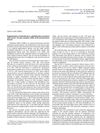 1 citations,
October 2010 in “Series in cosmetic and laser therapy”
1 citations,
October 2010 in “Series in cosmetic and laser therapy” Mesotherapy is a minimally invasive treatment with potential benefits and risks, requiring standardized practices and further investigation.

Monocyclic aromatic compounds are important for developing various drugs and treatments.
 January 2023 in “Advances in pharmacology and clinical trials”
January 2023 in “Advances in pharmacology and clinical trials” Human hair is a significant sample for various tests in clinical, nutritional, archaeological, and forensic studies.
 October 2018 in “InTech eBooks”
October 2018 in “InTech eBooks” The gene Foxn1 is important for hair growth, and understanding it may lead to new alopecia treatments.
64 citations,
June 1995 in “Steroids” Inhibitors of the enzyme 5 alpha-reductase could potentially treat disorders like prostate cancer and baldness.
4 citations,
March 2018 in “Systems biology in reproductive medicine” Men born very underweight had higher estrogen levels but normal reproduction compared to normal birth weight men.
65 citations,
August 2013 in “Acta Biomaterialia” The new matrix improves skin regeneration and graft performance.
20 citations,
March 2022 in “Journal of clinical medicine” Nearly half of the studied men with long COVID had low testosterone, including younger men.
13 citations,
August 1991 in “The Journal of the American Osteopathic Association” 4 citations,
December 2021 in “Journal of clinical laboratory analysis” A new mutation in the DCAF17 gene was found to cause Woodhouse-Sakati syndrome in a large family.
 November 2024 in “Applied Sciences”
November 2024 in “Applied Sciences” Placenta products might help with hair loss, but more research is needed.
September 2024 in “Journal of Ayurveda and Integrative Medicine” Ayurvedic treatments can improve symptoms and quality of life for systemic sclerosis patients.
 April 2024 in “JCEM case reports”
April 2024 in “JCEM case reports” A man's breast enlargement from low-dose finasteride for hair loss didn't go away, even with treatment, and might be more common than reported.
 November 2023 in “Nature Communications”
November 2023 in “Nature Communications” Cells lacking the Bax protein can outcompete others, leading to better tissue repair and hair growth.
508 citations,
June 2009 in “Current drug metabolism” Tyrosine kinase inhibitors effectively treat cancers but often cause skin and other side effects.
88 citations,
August 2019 in “Frontiers in immunology” Tyrosine kinases are important in skin autoimmune diseases and could be targets for new treatments.
 32 citations,
September 2015 in “Dermatology”
32 citations,
September 2015 in “Dermatology” Certain leukemia drugs can cause severe skin reactions that may require stopping treatment.
 25 citations,
November 2013 in “Journal of the American Academy of Dermatology”
25 citations,
November 2013 in “Journal of the American Academy of Dermatology” Many patients on new leukemia drugs had mild to moderate skin reactions.
 16 citations,
March 2013 in “JAMA Dermatology”
16 citations,
March 2013 in “JAMA Dermatology” A cancer drug called nilotinib might cause hair loss due to inflammation around hair follicles.
7 citations,
February 2012 in “British Journal of Dermatology” TH antibodies in vitiligo and AA patients recognize the same protein parts.
 6 citations,
November 2011 in “Journal of Dermatological Science”
6 citations,
November 2011 in “Journal of Dermatological Science” A new gene mutation may allow some piebaldism patients to regain skin color in white patches.
 1 citations,
June 2021 in “Journal of dermatology and dermatitis”
1 citations,
June 2021 in “Journal of dermatology and dermatitis” Tyrosine kinase inhibitors show promise in treating some skin diseases but their definitive role in dermatology is still unclear.

mEphA1 receptor tyrosine kinase is important for skin and hair development and may play a role in certain diseases.
December 2023 in “Journal of clinical medicine” Some leukemia treatments can cause skin reactions similar to keratosis pilaris.
 November 2023 in “The journal of investigative dermatology/Journal of investigative dermatology”
November 2023 in “The journal of investigative dermatology/Journal of investigative dermatology” Blocking TYK2 might be a new way to treat hair loss from alopecia areata.
 November 2022 in “The journal of investigative dermatology/Journal of investigative dermatology”
November 2022 in “The journal of investigative dermatology/Journal of investigative dermatology” TYK2 inhibition may help treat alopecia areata by promoting hair growth and reducing immune response.
July 2022 in “Journal of Investigative Dermatology” Inhibiting TYK2 can restore hair growth in alopecia areata.
October 2021 in “Authorea (Authorea)” New hair perming method using tyrosine is gentler and can be done with a blow-dryer.
October 2021 in “Journal of Investigative Dermatology” Blocking IL-12 can help treat alopecia areata by preventing hair follicle immune issues.
 January 2021 in “Journal of Cancer Therapy”
January 2021 in “Journal of Cancer Therapy” Tyrosine Kinase Inhibitors are effective against cancer but can cause skin, digestive, and blood side effects, including hair loss.
















